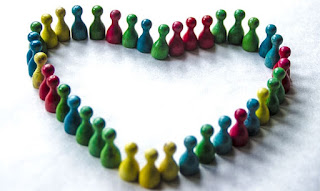For many years, autistic people have been told that we have no idea that other people are really people. That we don't know that others have their own thoughts, and their own opinions. That we think everyone else around us is an object of some kind, or maybe a robot.
Good heavens above. He actually thought this. This is truly shocking, isn't it. Our beloved autistic children...
That our minds were empty shells, unable to understand others, love, care or anything else.
From that belief-set came the extremist approaches, where it didn't much matter if people did appalling things to us - if we weren't really 'people', Human Rights didn't apply to us. And, we still see it now. Those following my Twitter threads on modern research see the results of this appalling misunderstanding in research paper after research paper. Yes, now, in 2020. Paper after relentless paper, treating autistic children as disposable unfeeling robots, ignoring their very real distress.
So, what is the truth of the matter? Do autistic people know that other people are indeed people? At the top, the result of a poll I ran on Twitter in November 2020. Yes, it's an informal way of getting answers. Yes, it's only reached whoever saw it on Twitter, so cannot represent every single autistic person. For example, it probably doesn't represent the 2% of autistic people who also have severe or profound learning disabilities and probably aren't on Twitter, but it's a really good thinking point. Just look at the results. Almost every single person responded that yes, of course they know other people are people with their own thoughts and feelings. https://twitter.com/AnnMemmott/status/1331166576566030336 is the original poll and the comments below it, for those who are interested.
I work in care home settings on a regular basis, as part of review teams. I've worked in the field of autism for two decades. I meet a lot of autistic people with high support needs and learning disabilities, and I've yet to find one who lacked the ability to know that people are people, or who lacked in caring and love for others. Sometimes they show that caring in ways that others don't recognise, because others misinterpret our patterns and communications.
The basis of good mental health is "I'm OK, you're OK". The belief that others have valid ways of being, communicating and making decisions, and that we do too. The belief that we are all human beings, entitled to basic human rights, and to our own views and emotions. It's very strange that nonautistic people have decided we're not people, when we are. That we're only allowed emotions that others approve of. Any display of anger at injustice is a 'challenging behaviour' which must be erased, if you're autistic. Which group has problems identifying who is a person, on that basis? Us, or nonautistic people? It's not a rude question to ask. It's an important question.
I would suggest that too many autistic people have been treated pretty appallingly for decades, based on ancient nonsense. I wish there was a better word to use for it, but the word 'nonsense' will do. Mostly they'd done experiments about this on autistic children with learning disabilities, rather than on the average autistic adult, for example. What a strange error.
Which people have been behaving like monsters?
I put it to society that we are all human.
We are all of equal worth.
Autistic people communicate and thrive differently.
Different is OK.
Until we learn to understand one another, and see one another as people of that full worth, we will miss out on so much. We'll miss out on autistic focus, dedication and honesty. We will miss out on autistic integrity, loyalty and humour. We will miss out on autistic creativity, friendship and love.
I see all of those things in every autistic person I encounter, because, as an autistic person, I see my people. People who have been relentlessly kind and helpful to me and my family for many, many years, as of course have nonautistic allies.
Time to put away the old myths. To realise that both autistic and nonautistic people can share life as their authentic selves. That both groups can learn something about how the other group communicate, and what the other group need. That both groups can learn to coexist, and thrive, together.
Time to look around us, and see how many wonderful autistic people are already in your community, your workplace. To read up on how many volunteer, how many are loving partners, how many give tirelessly to charity or to community. And to acknowledge the worth of every human, whether they do those things or not.
Thank you for reading.





